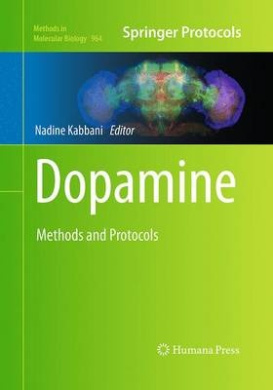Description
Dopamine, a catecholamine transmitter, plays a number of vital physiological roles in the brain and body, and, in recent years, studies on the role of dopamine in disease have opened new avenues of research and discovery. In Dopamine: Methods and Protocols, experts and key figures within the field provide detailed protocols on leading approaches in the study of dopamine within biological systems. Divided into sections on cellular/biochemical, imaging, genetics, and electrophysiology, this collections includes protocols for bioluminescence and fluorescence imaging, receptor immunoprecipitation and proteomic analysis, creation and characterization of a mouse model of Parkinson’s disease, real time measurement of dopamine in the brain, and modeling signal transduction in silico. Written in the highly successful Methods in Molecular Biology(TM) series format, chapters include introductions to their respective subjects, lists of materials and reagents, step-by-step, readily reproducible laboratory protocols, and tips on troubleshooting and avoiding known pitfalls. Authoritative and convenient, Dopamine: Methods and Protocols serves as an ideal guide for students and experts alike, as well as for anyone interested in exploring the vast and crucial field of dopamine research. Part I: Biochemical, Proteomic, and Computational Tools 1. Detection of Cell Surface Dopamine Receptors Jiping Xiao and Clare Bergson 2. Methods for the Study of Dopamine Receptors Within Lipid Rafts of Kidney Cells Peiying Yu, Van Anthony Villar, and Pedro A. Jose 3. Methods of Dopamine Research in Retina Cells Ana Lucia Marques Ventura, Fernando Garcia de Mello, and Ricardo Augusto de Melo Reis 4. Capture of D2 Dopamine Receptor Signaling Complexes in Striatal Cells for Mass Spectrometry Proteomic Analysis Nadine Kabbani and Jacob C. Nordman 5. Modeling Spatial Aspects of Intracellular Dopamine Signaling Kim Blackwell, Lane J. Wallace, BoHung Kim, Rodrigo Oliveira, and Wonryull Koh Part II: Cellular Imaging 6. A Biophysical Approach for the Study of Dopamine Receptor Oligomerization Sylwia Lukasiewicz, Agata Faron-Grecka, and Marta Dziedzicka-Wasylewska 7. Detection of Receptor Heteromers Involving Dopamine Receptors by the Sequential BRET-FRET (SRET) Technology Gemma Navarro, Peter J. McCormick, Josefa Mallol, Carme Llus, Rafael Franco, Antoni Corts, Vicent Casad, Enric I. Canela, and Sergi Ferr 8. BRET Approaches to Characterize Dopamine and TAAR1 Receptor Pharmacology and Signaling Stefano Espinoza, Bernard Masri, Ali Salahpour, and Raul R. Gainetdinov 9. Dopaminergic Regulation of Dendritic Calcium: Fast Multi-Site Calcium Imaging Wen-Liang Zhou, Katerina D. Ikonomu, Shaina M. Short, and Srdjan D. Antic Part III: Genetic Manipulation in Cells and Organisms 10. Functional Analysis of Human D1 and D5 Dopaminergic G Protein-Coupled Receptors: Lessons from Mutagenesis of a Conserved Serine Residue in the Cytosolic End of Transmembrane Region 6 Bianca Plouffe and Mario Tiberi 11. A Molecular Genetic Approach to Uncovering the Differential Functions of Dopamine D2 Receptor Isoforms Yanyan Wang, Toshikuni Sasaoka, and Mai T. Dang 12. Genomic Strategies for the Identification of Dopamine Receptor Genes in Zebrafish Wendy Boehmler, Jessica Petko, Victor A. Canfield, and Robert Levenson 13. Application of Cell-Specific Isolation to the Study of Dopamine Signaling in Drosophila Eswar Prasad R. Iyer, Srividya Chandramouli Iyer, and Daniel N. Cox Part IV: Electrochemical, Physiological, and Behavioral Analysis 14. Regulation of Dopamine Transporter Expression by Neuronal Activity Shalini Padmanabhan, Thach Pham, and Balakrishna M. Prasad 15. Monitoring Somatodendritic and Axonal Dopamine Release Using Fast-Scan Cyclic Voltammetry in Brain Slices Jyoti C. Patel and Margaret E. Rice 16. Real-Time Chemical Measurements of Dopamine Release in the Brain James G. Roberts, Leyda Z. Lugo-Morales, Philip L. Loziuk, and Leslie A. Sombers 17. The MPTP/Probenecid Model of Progressive Parkinson’s Disease Anna R. Carta, Ezio Carboni, and Saturnino Spiga






